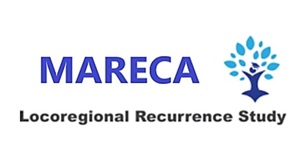MARECA
The MARECA Study- National Study of Management of Breast Cancer Locoregional Recurrence and Oncological Outcome
Overview
Despite continuing improvements in breast cancer treatment and patient prognosis, patients continue to develop locoregional recurrence (LRR). The 10-year cumulative incidence of LRR is reportedly as high as 8%.
Patients either present with in-breast local recurrence after breast conserving surgery and radiotherapy or with chest wall local recurrence after mastectomy. The Early Breast Cancer Trialists’ Collaborative Group meta-analyses suggest that patients in the former group may have better subsequent prognosis. Breast cancer can also recur in the ipsilateral regional lymph nodes (axilla, supra- or infra-clavicular, or internal mammary chains).
Currently there is a lack of high-quality data and clinical guidance for the optimal management of breast cancer patients diagnosed with LRR. Additionally, there is a need to identify prognostic factors, which will enable treatment tailoring to improve future patient outcomes.
Objectives
The MARECA study will determine the frequency, current management and prognosis of patients diagnosed with breast cancer locoregional recurrence (LRR) in the UK. The study objectives are
- To establish a prospective cohort of breast cancer patients diagnosed with LRR +/- distant metastasis in order to describe current management including:
- Use of radiological staging investigations and the proportion of patients found to have distant metastasis at presentation.
- Surgical management including the use of repeat breast conserving surgery and sentinel lymph node biopsy.
- Use of systemic therapies and radiotherapy used to treat locoregional recurrence.
- Investigate risk factors associated with LRR development including those related to the primary breast cancer and its management.
- Determine oncological outcome at 3 and 5 years, and evaluate prognostic factors.
- Stratify LRR as a true recurrence (TR) or a new primary (NP) breast cancer using clinical classification systems and explore if this distinction affects oncological outcomes.
Inclusion criteria
- Female or male patients more than 18 years old.
- Treated for previous unilateral or bilateral breast cancer (invasive cancer including all histological subtypes as well as ductal carcinoma in situ) with curative intent.
- No previous evidence of distant metastatic disease.
- Recently (within the last 6 months) diagnosed with new ipsilateral breast cancer locoregional recurrence (biopsy proven invasive cancer including all histological subtypes or ductal carcinoma in situ) +/- distant metastasis.
- Able to provide written informed consent.
- A minimum of 3 months interval between the resection surgery for the original cancer and the diagnosis of locoregional recurrence. There will be no maximum interval time period.
Exclusion criteria
- Patients where the new breast cancer diagnosis is in the contralateral breast.
- For patients who present with new bilateral breast cancer, the side with no previous cancer will be excluded.
- Patients diagnosed with distant metastatic disease with no evidence of LRR.
- Patients diagnosed with angiosarcoma.
- Patients with previous history of non-breast cancer treatment that was non-curative in intent.
- Patients who have had previous ipsilateral surgery for atypia, benign conditions, or phyllodes tumour and other breast sarcomas AND no previous ipsilateral primary breast cancer resection.
- Patients under 18 years old.
- Patients lacking capacity to provide written informed consent.
Planned sample size
500 patients
Total number of sites planned
50 UK sites
Timeline
MARECA has a planned patient recruitment period of 2 years (November 2021 to November 2023) with a planned follow up at 3 and 5 years.





